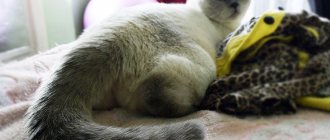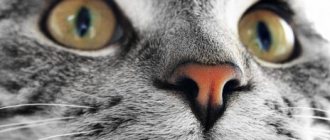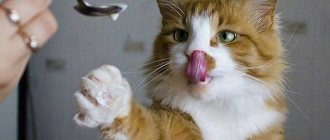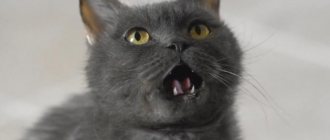What causes trembling in kittens?
There can be many reasons why your kitten may be shaking or trembling excessively.
Some of the most common causes of shaking kittens include: hypoglycemia, hypothermia, hyperthermia and anxiety.
© shutterstock
- Hypoglycemia means a significant drop in blood glucose levels due to depletion of glycogen stores. Because kittens are fairly small animals, their livers cannot fully produce enough glucose to help stabilize their blood glucose levels.
- Hypothermia refers to a decrease in body temperature and may occur as a result of hypoglycemia or may occur separately from hypothermia. Hypothermia can occur because young kittens (especially newborns) do not have enough fat and the means to regulate their body temperature.
- Hyperthermia means a significant increase in body temperature, which can cause fever and shivering. This often occurs due to viral infections, illnesses, or heat strokes.
- Anxiety and extreme fear may be associated with why the kitten is trembling. Sometimes a kitten may shake and tremble because he is simply afraid of a new environment because there is something about it that cats hate.
Physiological factors
If the baby is only a few days old and his mother is away somewhere, the baby's trembling may indicate that he is cold. You need to wrap him in something warm until the cat returns. Hypothermia is a common cause of kitten tremors even at an older age.
© shutterstock
Once the animal warms up, it will stop trembling. It is not recommended to allow situations in which a kitten, especially a very small one, would be very cold. Your pet may catch a cold because its immunity is not yet strong.
Quite often, owners notice trembling in kittens at the age of seven to eight months. This may indicate the onset of puberty in both females and males. The phenomenon is completely normal. If the animal is not sterilized, it will most likely tremble every time it experiences sexual desire.
Babies are so cute when they sleep, but sometimes the trembling of a kitten's body during sleep causes great concern for the owner. Veterinarians say there is no need to worry. If your baby's paw, head, tail, or whole body twitch periodically, it means he is dreaming about something emotional. Or he moves from the superficial phase of sleep to the deep one.
How to stop kittens when they shake?
If you have a kitten that you feel is shaking a lot, is very lethargic and is unable to move, it is highly recommended that you speak to your local veterinarian.
In cases such as hypothermia and hypoglycemia, your veterinarian may recommend fluids and glucose therapy given intravenously or subcutaneously. This is necessary so that the kitten does not go into shock.
In cases such as hyperthermia, where the fever causes shivering, your veterinarian may simply perform a full physical examination and review the kitten's recent vaccination and medication history. To diagnose the root cause.
For kittens that are simply scared and anxious, the best way to stop shaking and shaking is to help them feel safe and give them time. Try to keep the kitten in a quiet room where he will be comfortable.
What to do if your cat, cat or kitten is constantly shaking?!
Having discovered tremors in your pet, you should observe what other symptoms are accompanied by tremor, whether there is a fever, whether there is a refusal of food and water, lethargy, bad breath, ears, various discharge from the nose, eyes, etc. If at least some of the above signs are present, you need to urgently show it to a specialist.
To avoid unnecessary stress for the cat, when a visit to the clinic is impossible for some reason, when the animal cannot be transported, an on-call veterinarian will come to the rescue.
Providing emergency care, taking the necessary tests, recommendations for further treatment, emergency hospitalization if necessary - all this is within the competence of a veterinary specialist visiting the home.
Caring for a bedridden patient with dementia
Senile dementia does not act selectively: it can overtake anyone, including a bedridden patient. In this case, it is even more difficult for relatives. In addition to the heavy physical exertion associated with caring for a bedridden patient, psychological problems arise. Being immobile, patients cease to control the natural processes of the body. Trips to the toilet become more frequent, and many manage to take off their diapers and smear waste products on the walls, beds, and get dirty themselves. If dementia reaches this level, home care becomes real torture for relatives. You need to be nearby around the clock and stop any attempts to remove the diaper.
Relatives are also required to carry out a number of mandatory measures: carrying out sanitary and hygienic procedures, preventing bedsores, administering medications, feeding from a spoon or through a tube (in case of impaired swallowing reflex). In this case, it is better to go to a boarding house for bedridden patients with dementia, where all the necessary care measures are performed daily and a general practitioner monitors the dynamics of the health status on a weekly basis.
What treatment is prescribed?
After making a diagnosis, the veterinarian will tell you what to do next and prescribe an individual treatment regimen. Tremor that occurs for physiological reasons does not require special treatment. The animal should be protected from stress factors and ensure that it is less nervous and worried. To prevent your cat from suffering from tremors and hormonal surges during the period of estrus, you should take care of finding a partner in advance, and if breeding offspring is not included in your plans, then it is recommended to undergo sterilization surgery.
In addition to basic treatment, it is important to include vitamin supplements in your pet’s diet that will help strengthen the immune system.
If the root cause of tremors is any internal pathology, a comprehensive treatment regimen is prescribed to get rid of the original source of the problem. In addition to taking medications, the owner should take care of the nutrition of his four-legged friend. After all, if a cat eats low-quality food, this also negatively affects its health and causes tremors. If there are problems with the kidneys and organs of the urinary system, experts advise switching the cat to holistic food. In addition, after consulting with a veterinarian, it is useful to periodically give your pet special vitamin and mineral supplements that support the immune system and increase the body’s resistance to the effects of negative external factors.
Diagnostics
The animal must be urgently shown to a doctor if trembling constantly bothers you, the cat is lethargic, lies down all the time, eats poorly or generally refuses to take food and water. At the initial appointment, the veterinarian will examine the pet, ask the owner about disturbing accompanying symptoms, and collect other important information. The following research methods will help determine an accurate diagnosis:
- general blood test, urine test;
- biochemistry;
- coprogram;
- microbiological examination of a smear from mucous membranes;
- ECG;
- radiography;
- Ultrasound of internal organs.
How to treat a pet?
To cure a disease, the cause must be eliminated.
If it is caused by taking medications, stop taking it. For helminthiases, the cat is given a drug that removes them. They go to the toilet and the worms will come out along with the feces. Piroplasmosis is treated with special substances that kill Babesia. In case of inflammation and infections, you need to relieve this process with anti-inflammatory or antibiotics. Maintenance therapy and pills to boost immunity are used. Only a doctor can identify the cause and prescribe the correct treatment.
Source
What to do if the animal gets worse
If the cat is getting weaker and weaker every hour, all efforts must be put into finding a clinic. Fortunately, many of them work around the clock; doctors will provide assistance even late at night. The faster the cat is taken to the clinic, the greater the chance of recovery.
When you can't put off visiting a doctor
The following conditions are critical:
- the cat refuses food for more than 18-20 hours;
- uncontrollable vomiting, vomiting black (digested blood);
- diarrhea mixed with dark blood, diarrhea “water”;
- unnatural position - lying on the chest or on the back with outstretched paws;
- “rag” state – the cat lies down and does not react to anything;
- the cat began to lose weight sharply;
- the cat began to breathe heavily, shortness of breath appeared after moderate exercise;
- does not go to the toilet “in a big way” for more than two days;
- the cat has difficulty getting up and has difficulty walking;
- the cat began to cough and sneeze frequently, and only breathes through its mouth;
- convulsions;
- yellowness of the skin.
If you experience any of these symptoms, you need to act immediately. Thinking that “it will go away on its own” is negligence towards your pet.
Yellowness of the skin
Natural Causes of Lethargy
The reasons for a lethargic, apathetic state can be simple and banal. For example, a similar reaction is possible to a change in weather. Most cats are more sensitive to changes in atmospheric pressure and the change from warm to rainy weather with gusts of wind compared to weather-sensitive people. But unlike people, a cat cannot say that it doesn’t feel well or take a pill to normalize its blood pressure. That is why she becomes lethargic, sad and phlegmatic, tries to sleep more and eat less, which is why she seems tired to her owner.
Nocturnal epilepsy symptoms
With autosomal dominant nocturnal frontal lobe epilepsy, the following nocturnal attacks are observed:
- attacks upon sudden awakening at night, can be short, sometimes missed by patients, can be accompanied by screaming, affect (fear);
- hypermotor attacks (high-amplitude, fanciful movements), tonic (stretching, arching), clonic (sharp contractions of the muscles of the limbs, torso), consisting of cyclic movements (boxing, pedaling) or pushing;
- nocturnal attacks similar to sleepwalking, accompanied by fear (for example, jumping out of bed, running, looking around, screaming, speaking articulate phrases);
- There may be various combinations of these attacks during sleep.
Features of symptoms of autosomal dominant nocturnal frontal lobe epilepsy:
- family history of epilepsy is burdened (relatives have cases of epilepsy or parasomnias);
- onset of epilepsy at puberty (10-14 years);
- There may be only nocturnal attacks or mainly during sleep with rare daytime ones;
- attacks are frequent, there can be 1-5 attacks per night every night;
- The attack is provoked by emotional and physical stress, weather changes, menstruation, sleep disturbances;
- oxcarbazepine and combinations of antiepileptic drugs are used in treatment; but a third of patients are drug-resistant.
“Nocturnal epilepsy in adults”, “Nocturnal epilepsy in children”, “sleep epilepsy” - this is how patients often call Autosomal dominant nocturnal frontal lobe epilepsy. Such epilepsy can begin at any age: in childhood and in adulthood. In 30% of patients it is resistant to antiepileptic drugs, so it can continue throughout the patient’s life. The use of polytherapy of this form can achieve only a slight reduction in the strength, frequency and duration of nocturnal epilepsy attacks.
Other reasons
Helminthiasis
The disease is caused by parasites - worms. They can be present in grass, food, soil, water. Once in the animal's body, they use it for survival. The cat has health problems. Symptoms depend on the degree of worm infestation. The cat does not eat, vomiting, diarrhea, cough, hair loss, rashes appear, the pet scratches its butt near the anus. The tummy gets bigger. Symptoms of intoxication appear.
Age of the cat
An old cat becomes lethargic, sleeps a lot, plays little, appetite, hearing, vision and smell are impaired. The fur becomes dull. As an animal ages, its behavior changes. Or the pet becomes more affectionate, climbs into your arms, caresses. Or, on the contrary, he shows nervousness and aggression. The immunity of cats decreases, which is why they are susceptible to infections.
Vaccinations for babies
Vaccination protects animals well from various diseases. However, complications may occur. Both allergies and individual reactions. After vaccination, the kitten eats poorly, is lethargic, drowsy, refuses to eat, and the temperature rises. The nose becomes hot or cold. If these symptoms last more than 3 days or are too severe. you need to contact your veterinarian.











